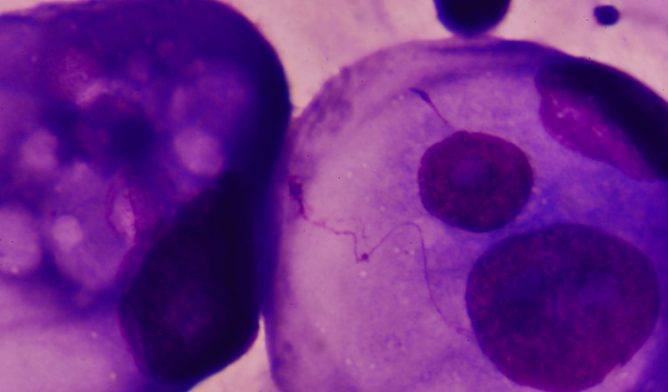Mesothelioma Detection May Come Earlier with Liquid Biopsy
Treatment & DoctorsWritten by Tim Povtak • Edited By Walter Pacheco
Asbestos.com is the nation’s most trusted mesothelioma resource
The Mesothelioma Center at Asbestos.com has provided patients and their loved ones the most updated and reliable information on mesothelioma and asbestos exposure since 2006.
Our team of Patient Advocates includes a medical doctor, a registered nurse, health services administrators, veterans, VA-accredited Claims Agents, an oncology patient navigator and hospice care expert. Their combined expertise means we help any mesothelioma patient or loved one through every step of their cancer journey.
More than 30 contributors, including mesothelioma doctors, survivors, health care professionals and other experts, have peer-reviewed our website and written unique research-driven articles to ensure you get the highest-quality medical and health information.
About The Mesothelioma Center at Asbestos.com
- Assisting mesothelioma patients and their loved ones since 2006.
- Helps more than 50% of mesothelioma patients diagnosed annually in the U.S.
- A+ rating from the Better Business Bureau.
- 5-star reviewed mesothelioma and support organization.
Testimonials
My family has only the highest compliment for the assistance and support that we received from The Mesothelioma Center. This is a staff of compassionate and knowledgeable individuals who respect what your family is experiencing and who go the extra mile to make an unfortunate diagnosis less stressful. Information and assistance were provided by The Mesothelioma Center at no cost to our family.LashawnMesothelioma patient’s daughter
How to Cite Asbestos.com’s Article
APA
Povtak, T. (2020, October 16). Mesothelioma Detection May Come Earlier with Liquid Biopsy. Asbestos.com. Retrieved April 24, 2024, from https://www.asbestos.com/news/2020/02/18/liquid-biopsy-mesothelioma/
MLA
Povtak, Tim. "Mesothelioma Detection May Come Earlier with Liquid Biopsy." Asbestos.com, 16 Oct 2020, https://www.asbestos.com/news/2020/02/18/liquid-biopsy-mesothelioma/.
Chicago
Povtak, Tim. "Mesothelioma Detection May Come Earlier with Liquid Biopsy." Asbestos.com. Last modified October 16, 2020. https://www.asbestos.com/news/2020/02/18/liquid-biopsy-mesothelioma/.

Cellular Analytics, a biotechnology company in Ontario, Canada, has unveiled a novel liquid biopsy test for mesothelioma that could lead to more effective management of this rare cancer.
The CytoFind test has the potential to produce a much-earlier diagnosis of disease and the ability to personalize treatment by better predicting a patient’s response to specific therapies.
Working in collaboration with Dr. Marc de Perrot, a mesothelioma research specialist and thoracic surgeon, the company used their platform to capture mesothelial precursor cells that are characteristic of the cancer.
“We could change completely how this disease is viewed,” Dr. Brent Zanke, a specialist in diagnostic oncology and chief executive officer of Cellular Analytics, told The Mesothelioma Center at Asbestos.com. “It’s a proactive way to get ahead of disease.”
Mesothelioma, which is usually caused by exposure to toxic asbestos fibers, has no definitive cure and few obvious symptoms in its earliest stages.
Treatment Options Would be Greater
Diagnosis today requires several steps, including a CT scan and an invasive biopsy. Mesothelioma typically is not diagnosed until it has reached an advanced stage when treatment options are limited and survival times are short.
This latest, state-of-the-art technology centers on circulating tumor cell (CTC) capture and detection, a science which advanced considerably in 2019.
Researchers today are refining it to purify and extract those cells for different cancer diagnostics.
This specific platform — named CytoFind — was uncovered in the laboratory of University of Toronto researcher Dr. Shana Kelley, who also serves as the chief scientific officer of Cellular Analytics, founded in 2019.
The microfluidic platform — the only one of its kind — enables molecular characterization of cancer at the level of single-circulating tumor cells, which solid tumors have shed into the blood stream.
“Mesothelioma is like every cancer, the earlier detected and treated, the better off you are,” Zanke said. “We can advance that.”
The technology also is designed to detect sensitivity to immune-oncology agents at lower sample volumes, potentially positioning patients for the burgeoning development of novel immunotherapy drugs.
“The essence of precision medicine demands more sensitive and flexible diagnosis to accompany every new experimental therapy,” Zanke said. “Our CytoFind platform delivers on these challenges with unprecedented fidelity.”

Early Testing Looks at Potential
The testing for early-stage disease is being used now on volunteers who believe earlier exposure to asbestos made them potentially vulnerable to the development of mesothelioma.
Cellular Analytics has begun reaching out to various labor unions, whose occupations put its members at risk for asbestos exposure.
It usually takes 20 to 50 years before obvious mesothelioma symptoms arise after the inhalation or ingestion of asbestos fibers. Only a small percentage of people exposed to asbestos actually develop the disease.
“What we have found is that people with scarred lungs but no frank diagnosis of mesothelioma often have very high numbers of these circulating, premalignant cells,” Zanke said. “We want to see what happens to these patients with high circulating counts. Are they at greater risk for developing mesothelioma?”
Zanke believes those patients should be tested every few months — done easily with blood samples — with an eye on rising premalignant cell counts.
“There is potential to be diagnosed even before, or just as, you are developing malignant disease,” he said. “It would kind of be the holy grail, where you could tell somebody what’s in their immediate future and do something about it.”
Zanke believes that CytoFind offers unprecedented capabilities to isolate tumor cells and analyze protein markers to direct treatment that could lead to a cure for early-stage, or pre-stage mesothelioma.
Cellular Analytics also is exploring its use with lung cancer and prostate cancer.
“The whole concept of uncovering these cells that are not benign, but not yet malignant, just changing from one to the other, is possible,” Zanke said. “This could open up a whole new disease category to be therapeutically exploited.”







